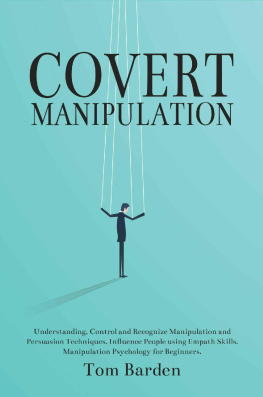Gaslighting,
the Double Whammy,
Interrogation, and
Other Methods of Covert Control
in Psychotherapy and Analysis
Gaslighting,
the Double Whammy,
Interrogation, and
Other Methods of Covert Control
in Psychotherapy and Analysis
THEO. L. DORPAT, M.D.

This book was set in 11 pt. Berkeley Book by Alpha Graphics of Pittsfield, New Hampshire, and printed and bound by Book-mart of North Bergen, New Jersey.
Copyright 1996 by Jason Aronson Inc.
10 9 8 7 6 5 4 3 2 1
All rights reserved. Printed in the United States of America. No part of this book may be used or reproduced in any manner whatsoever without written permission from Jason Aronson Inc. except in the case of brief quotations in reviews for inclusion in a magazine, newspaper, or broadcast.
Library of Congress Cataloging-in-Publication Data
Dorpat, Theodore L.
Gaslighting, the double whammy, interrogation, and other methods
of covert control in psychotherapy and analysis / Theo. L. Dorpat.
p. cm.
Includes bibliographical references and index.
ISBN 978-1-56821-828-1
1. PsychoanalysisMoral and ethical aspects. 2. Control (Psychology) 3. Psychotherapist and patientMoral and ethical aspects. 4. Mental suggestionMoral and ethical aspects. 5. Brainwashing. 6. Manipulative behavior. I. Title.
[DNLM: 1. Power (Psychology) 2. Psychotherapy.
3. Psychoanalysismethods. WM 420 D715i 1996]
RC506.D668 1996
616.8914dc20
DNLM/DLC
for Library of Congress
96-14098
Manufactured in the United States of America. Jason Aronson Inc. offers books and cassettes. For information and catalog write to Jason Aronson Inc., 230 Livingston Street, Northvale, New Jersey 07647.
To my wife, Doris,
and my daughter, Joanne Halverson,
gratefully.
For those who stubbornly seek freedom, there can be no more urgent task than to come to understand the mechanisms and practices of indoctrination. These are easy to perceive in the totalitarian societies, much less so in the system of brainwashing under freedom to which we are subjected and which all too often we serve as willing or unwitting instruments.
Noam Chomsky, 1987
Contents
Acknowledgments
I would like to express my appreciation and gratitude to the following colleagues who provided me with valuable criticisms and recommendations for the preparation of this manuscript: Dr. Maxine Anderson, Dr. Katalina Bartok, Dr. Robert Bergman, Dr. Austin Case, Dr. Margaret Crastnopol, Dr. Raelene Gold, Dr. Mel Knight, Dr. Robert Langs, Dr. Stanley S. Mandell, Dr. Karol Marshall, Dr. Paul Ornstein, Dr. James Raney, Dr. David Rowlett, Dr. Robert Stolorow, Dr. Max Sucharov, and above all, Dr. Michael Miller, who carefully checked the entire manuscript.
I am especially grateful to Ms. Jean Keating for editing and preparing the manuscript.
Introduction and Overview
My overall aim in this book is to write about a widespread and serious malady in the way many clinicians conduct psychotherapy. I believe this unrecognized disorder has been present throughout this century and that it is widely prevalent in this country and elsewhere. There are two chief symptoms or manifestations of this disorder and they are (1) the clinician frequently uses methods of indoctrination for the purpose of controlling and directing the patient, and (2) the clinician is unaware because of ignorance and/or denial of the fact that he or she uses such indoctrination methods and their short-term and long-term effects on patients. More often than not, patients are also not aware of the use of these methods or of their effects on themselves.
My purposes are to describe and discuss this hidden disorder as well as its multiple manifestations, signs, and symptoms, and I shall illustrate my arguments with vignettes and case studies. Also, I present some hypotheses and speculations about its different causes.
A major part of this book is taken up with a study of eleven psychoanalytic and psychotherapy treatment cases in which the use of indoctrination methods either caused treatment failure or greatly impaired the therapeutic process. Psychotherapy or psychoanalytic cases that have failed are seldom talked about or written about. The fields of psychotherapy and psychoanalysis have something immensely important to learn from the examination of cases that have failed, or in which the process and progress of the patient have been adversely affected by the use of indoctrination methods. A recent panel (Nuetzel 1993) at a meeting of the American Psychoanalytic Association concluded that case reports of failed treatment could teach us at least as much as reports of successful treatment.
The sexual seduction and overt abuse of patients by some practitioners is only the visible tip of the iceberg of the widely prevalent abuse of power by mental health professionals. The more gross kinds of patient abuse, such as financial or overtly sexual exploitation, are expressly forbidden by rules and bylaws in medical, psychotherapy, and psychoanalytic organizations. Both in Freuds time and in our own time, however, there are few laws or regulations set down to discourage the more subtle and covert forms of interpersonal control, exploitation, and abuse. The use of more covert methods of interpersonal control and other indoctrination methods is not even considered abnormal or exploitative by many clinicians.
Occasions when practitioners are overtly cruel, abusive, demeaning, or in other ways directly hurtful to patients are most uncommon and such actions among mental health professionals are universally proscribed and condemned.
This is not so with the less obvious kinds of controlling, directive, and covertly abusive communications by clinicians which I aim to describe and discuss in this book. Though (unlike some other types of psychotherapy) psychoanalysis specifically proscribes the use of directive and controlling methods and the varied forms of indoctrination, their use is nevertheless widespread in psychoanalytic treatment. For the purposes of this book, I use the term psychoanalytic treatment to refer both to psychoanalytic psychotherapy and psychoanalysis.
From Freud on to the present time, psychoanalytic treatment has often been compromised by a set of controlling attitudes and indoctrination methods contrary to its avowed values and technical precepts. My studies suggest there exists among many, perhaps most, practitioners a complex of disavowed aims, strategies, and actions carried out for the most part unconsciously in the interests of directing and dominating their patients.
Because these actions are basically the same as the ways individuals in nontreatment situations control and indoctrinate others, I have used the general term indoctrination methods to refer to all of the ways clinicians control, direct, and manipulate patients.
For the purposes of this study, I have coined the term covert methods of interpersonal control to refer to a subclass of indoctrination methods. The tactics and methods of covert interpersonal control include different types of projective identification wherein individuals, through various kinds of interpersonal manipulation, exert control over the cognitions, affects, and overt behaviors of others. My definition of covert methods of interpersonal control specifically excludes overt and explicit communications or concrete actions of control and abuse such as threats of violence, rage, tantrums, denunciations, and other openly hostile actions taken by individuals to dominate and/or shame other persons.










